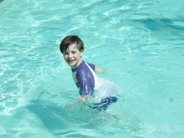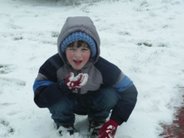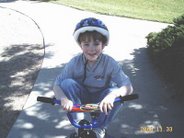Apparently there is a family who are moving and cannot take their autism assistance dog with them...female...spayed....all shots...5-6 years old...name of Patches. Noah could get the dog for free if we can work something out. Course right now still being in grandma's house poses a problem.....
AUTISM ASSISTANCE DOG | 4 Paws was the first agency to begin placing skilled Autism Assistance Dogs and continues to be the largest organization in the United States and the only organization placing in other Countries Autism Assistance Dogs with tracking. While other smaller organizations are attempting to duplicate our services 4 Paws remains the organization that services such as the National Autism Center recommend to their families. Having placed well over 50 Autism Assistance Dogs, this type of dog continues to be the most requested and most often placed dog of all of our services. As the founding agency of Autism Assistance Dogs with tracking we continue to provide the highest quality of dogs to every child that applies. 4 Paws, unlike almost every other agency does not pick and choose who's child will get a dog. As long as the child's physician approves the dog and it is safe to place a dog in the home, no family is turned away. We continue our services with no long waiting lists and continue as always to "partner" with our families to provide the dog their child needs. In addition, our online group for 4 Paws Families has a membership of 80+ dogs. With a group of families, all either having, or in the process of obtaining a service dog from our agency, all in one place with access to each other it is obvious that our families love their dogs and are very happy with our service dogs. They feel that being a part of the 4 Paws family as an honor and are happy to remain on our online network to help the next group of families find the same happiness they did in a friend with 4 Paws. |
Children with disabilities present a unique challenge to parents. Autism presents even more unique challenges than other more prevalent disabilities. The child with Autism does not connect well with their environment. Autism manifests itself most strikingly as impairments in communication and in the formation of social relationships. Children with Autism are often nonverbal or when they are verbal they usually do not use the skill to actively communicate with other people in their environment. Many children with this disability have a strong need for a structured, routine environment; change creates feelings or fear and/or anxiety. Some children even exhibit serious behavioral changes including, at times, self-injury.
 | | "While Scooby may love cats more than the cats would prefer, Autism Assistance Dog, Scooby is the friend Tyler has waited so long to find. Scooby knows nothing of the word 'different'; in Scooby's eyes Tyler is the perfect friend just the way he is." | | Tyler loves Scooby like he has never been able to love a person. He kisses him all the time. He is so proud too. He announces everywhere we go, "This is Scooby, my service dog. Scooby, meet _________. Scooby is the best dog in the world!" This might sound strange, but Scooby brought Tyler over the "kissing" hurdle. Tyler could not stand to kiss before Scooby. He would allow me to kiss his cheek or forehead, but would never kiss back or let you kiss his lips. He kisses me know and even kissed me on the lips once. He said , "I'm kinda gettin' used to that. Scooby kisses me too." What a gift!!!! Thank you for Scooby and all he has brought to our family. We wouldn't be complete without him.
Woof!!!!!
Love,
Linda and Tyler | | 
| |
Another behavior common to Autism is a tendency to wander away. Parents often refer to their children as “Houdini,” stating they are able to escape from even the most secured environment and the family usually has multiple locks on every door and window in the home. When this happens, the child may be in a life-threatening situation, especially if they are already out of the physical sight of their caregiver. Children with Autism often don’t respond to their names consistently, if they respond at all. They rarely understand the many dangers in their environment; an approaching car; a stranger with ill intentions; an aggressive dog separated from the child by nothing more than a gate, which is quite easily opened. Many parents report that their greatest fears center around their child being missing or when out with their child that they might look away only for a minute and turn to find their child gone or darting out into the path of an oncoming car.
 | | "Joshua Melton, meets Autism Assistance Dog, Skeeter for the first time" | | No one knows exactly what causes Autism but the children often appear to live in a world we have little understanding of. Often they participate in ritualistic and repetitive behaviors, sometimes for hours at a time. They may spin a coin on the floor, flap their hands in their face, or filter sand through their fingers. Many times parents report that a hand placed on their child’s arm for only a brief second might cease the repetitive behavior for several minutes or longer. Some researchers believe that children with Autism have a heightened level of sensory input; at times resulting in sensory overload. |
A child in a gym may become agitated; holding their hands over their ears and repeating moaning type verbalizations when a basketball is being bounced on the floor over and over, and cease the behavior the minute they are moved to a quieter room.
| At 4 Paws we have discovered a magic that exists between children and dogs, a magic that can become a life-saving miracle for a child paired with one of our Autism Assistance Dogs. One of the tasks the dogs can be trained to do, that is unique to 4 Paws For Ability TM, Inc. is the ability to track a child that has wandered away, even if the child has been missing for quite some time! |  | | "Patrick Eggleston and Autism Assistance Dog, Mojo" | |
When a child with Autism disappears their life is in danger and an adult looking for them may begin their search in the wrong direction; while a 4 Paws Autism Assistance Dog trained in search and rescue never takes the wrong path and quickly leads the adult to the missing child!
While the needs of each child are unique, all of the families contacting 4 Paws have one very important common need; every family reports that their child has few, if any, friends. Other children don’t understand their behaviors and even higher functioning children, often diagnosed with Asperger’s Syndrome, are not able to form the social relationships needed to sustain friendships, even at the elementary school level. Asperger’s is exceptionally difficult for parents, who watch as the disability interferes in their child’s life, as the children most often know that the other children are making fun of them and/or leaving them behind as they form their social groups. One child getting an Autism Assistance Dog spoke to 4 Paws staff during his interview. He told us that he was from another planet where no one makes fun of people who are different. His mother reported that the teasing he received at school had so seriously affected his life that he tried to commit suicide by over-dosing on medication.
 | | On a quiet train ride through the zoo, Noelle sits by herself. While previously her Mom would have had a death grip on her, with Noelle safely tethered to her service dog, Reagan, fun is had by all. | | At 4 Paws we find it intriguing that there are so many families with our Autism Assistance Dogs, that report their child has formed or is forming, what appears to be a close relationship with their dog partners. It is interesting to say the least that we have found the children in our program are able to relate to their dogs in ways that they were unable to with humans. Our research indicates that the child with Autism displays behaviors toward their dog that they rarely, if ever, display towards human companions. In addition, the child that is partnered with a 4 Paws dog is found to seek their dog out for companionship, comfort, and confiding in ways never shown to family members. One of our children that has a 4 Paws Autism Assistance dog, is a three year old child who has the ability to communicate verbally but rarely, if ever, chooses to use it until a wonder-dog named Harley entered her life. Within a week she could be found giving her new doggie partner commands to sit, down, stay, and come. In addition, she would spend hours laying on top the cuddly hound type dog, whispering secrets in his ear. We would all like to know the secrets of a three year old child with Autism, but Harley is a true to the end, “best friend” who will never share the secrets she has entrusted him with! |
Some parents of children with 4 Paws Autism Assistance Dogs report their child has showed greater sensitivity towards the needs and feelings of the dog, together with a lack of anger and aggression. In spite of a strong dislike by many children with Autism to being touched and/or hugged there appears to be an evident enjoyment of tactile stimulation and comfort level with the dog. What we here at 4 Paws have seen time after time in our Autism Assistance Dog Program shows that the child with Autism may be able to demonstrate behaviors toward their dog that they do not display to people, even family members, and which are similar to those associated with close relationships.
| So, we take the child with Autism and all the difficulties they have with verbalization, communication, and social relationships and pair them with a well trained quality service dog specifically trained to meet their unique needs; to create a consistency in the child’s life as their dogs go every where that they go, even within places of public accommodation, and the educational system bringing along with them: consistency, stability, and calm reassurance that the feelings of anxiety or fear are not needed because the trusted buddy is by their side. As they meet their dog partners and develop the bond that we have been speaking of; an unconditional, unconventional, and a miraculous loving friendship is developed and with each day passing, grows stronger, bringing along with it, a chance that the child may transfer their new social relationship to the humans in their environment as well. | | 
| | While Noah's family once had to hold onto him whenever daring to do some shopping. Noah now walks calmly beside his 4 Paws service dog Murphy, holding to a second leash and entertains himself playing with Murphy's ear. | |
 | Sophie, is shown here tethered to her Autism Assistance Dog, Bob at a local mall! | | There are several additional skills that we at 4 Paws have developed to assist the child with everyday comforting, and behavioral management. When the child engages in repetitive behaviors as discussed above and when a simple hand placement on the child is all that is needed to have the behavior cease, at least for a few minutes but often even for hours, a service dog trained specifically to respond to a child’s most repetitive behaviors is just what they needed. We use the behavior the child engages in to trigger a behavior in the dog. So for example, the behaviors of a child that jumps and flaps their hands in front of their face has been used as a hand signal for the dog to lay their nose or foot on the child, gently nudging them to stop the repetitive behavior, even if for a few minutes. For adults, the continuous nudges or hand placement they engage in to stop their child’s unique, repetitious behaviors can become burdensome and/or frustrating. |
However, for the dog, it’s a game and as long as they receive an occasional reward at various intervals, while they are nudging the child over-and-over again, the dog finds the situation quite fun; a job that allows them to do what they do best…encourage the child to cease repetitious behaviors and in nudging the child there comes a possibility that the child may decide petting the dog, playing ball with them, or simply cuddling with them to be more impacting on their life than the need to engage in repetitive behaviors.
 |  |  |
| BEHAVIOR DISRUPTION - Touch |
Another skill that is sometimes requested by parents with children who have Autism, is the ability to have their child walking in front of them rather than their having to have their hand on the child at all times. In these instances a longer leash is used by the parent, which allows them to be in total control of the dog while they are teaching their child a new routine holding a second, shorter leash as they walk beside their new partners. As they approach the street, the 4 Paws dog is trained to stop and sit any time the parent requests them to and it is hoped that when the dog stops to sit the child will also stop, even if for a minute, giving the parent the time to catch up to the child and assist them in crossing the street safely. It is also possible for families to actually tether their child to the dog from the dogs harness to the child's belt loop. The parents maintain the child's safety by holding a leash attached to the dog to easily stop the dog using basic obedience commands. In this manner, parents may engage in such tasks as writing a check for their groceries without the fear their child will disappear in the few moments it takes to look at the check as you write it. Parents can ask the dog to either "stop" momentarily or "stop and sit/down" when more time is needed.
 | | BEHAVIOR DISRUPTION - Lap | | The mission off our Autism Assistance Dog Program is to provide friendship, companionship, unconventional, and unconditional love for the child. A source of comfort and consistency when environments change and anxiety might be high, to help the children with Autism and the other family members find a higher quality of life and bring a more independent life to the child and the support to encounter problems and obstacles set in front of them by Autism and overcome any challenges that they are confronted by. |
It is also our hope to provide a dog that will be the child’s best friend and buddy, so that the child will relate to the dog on a higher social level than they ever experienced before, and transfer these accomplishments to the humans which also live within their home and/or school environment.
With the number of children currently being diagnosed with disabilities falling in the Autism spectrum, at an increasingly higher frequency and at much younger ages that ever before; the need for Autism Service Dogs is on the rise. 4 Paws is proud to be the Autism Assistance Dog Program most recognized by national Autism organizations. We seek every day to develop more ways in which our dogs can help families with children that have Autism. We encourage parents to ask us about any situation, no matter how silly it may seem to them, which they hope a dog could help with; if it can be done and completed in such a fashion as to not effect safety issues for either the child or the dog, we will give it our best shot.
All over the country teachers and therapists have found that including therapy dogs or service dogs placed with children, into their therapy sessions, shows a marked increase in the child’s participation and functional level.
If you think an Autism Assistance Dog would benefit your child, please take a moment to read about how our program works at www.4pawsforability.org . Look for the page link on the left side of the homepage that reads “How Our Program Works” and if you feel this program will work for you, download the child application right off the homepage using the button that says “child application”. The 4 Paws recipient and their family are involved in the entire process, from application, through fundraising, and on to training. When the time comes to chose the dog, we take into account the family dynamics, their preferences for certain breeds of dogs, color, sex, size, and coat type. The dog is then chosen specifically to meet the child’s needs. Once we decide on a dog, a picture is sent and the child can name the dog. We want our families to know the dog is theirs, the dog will help them, and the dog will be in their possession quickly because they are working to make that happen!
| 
|
| David, who received the first 4 Paws Autism Assistance Dog placed in Canada, meets his k9 partner, Kai for the first time. Kia seems to understand that David needs some space to get used to having her with him. How dogs know what they do is a mystery we will never find the answer to but when it comes to children with Autism, this mystery of how the dogs know just what their young partners need, is nothing less than magical. |
| At 4 Paws, we understand the unique challenges for children with Autism. Because we are training parents and not children, though it is good when the child can attend the training, we do not require children with Autism travel. Only one parent needs to attend the training. |
4 Paws For Ability TM™, Inc. a non-profit agency taking the ‘dis’ out of disABILITY!™ 253 Dayton Ave. Xenia, Ohio 45385
training center 937-374- 0385
cell phone number 513-518-0529
or karen4paws@aol.com | |






































 This website is part of the autism-assembly, this is a coalition of
members of the autistic community who share the common goal of seeking
acceptance for those on the autistic spectrum, who aim to educate about
autism, and who are not seeking a cure for autism. This is part of the
global autism rights movement.
This website is part of the autism-assembly, this is a coalition of
members of the autistic community who share the common goal of seeking
acceptance for those on the autistic spectrum, who aim to educate about
autism, and who are not seeking a cure for autism. This is part of the
global autism rights movement.



No comments:
Post a Comment